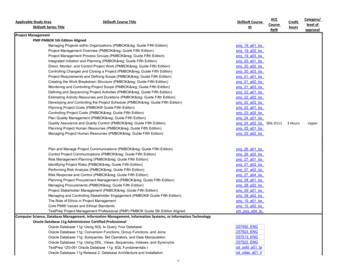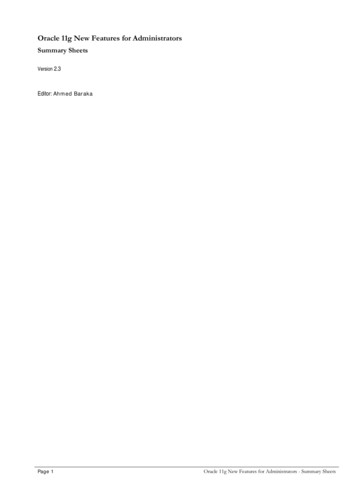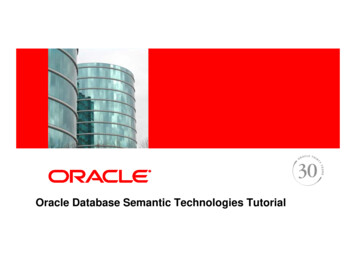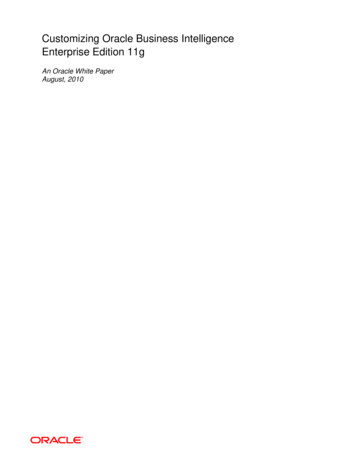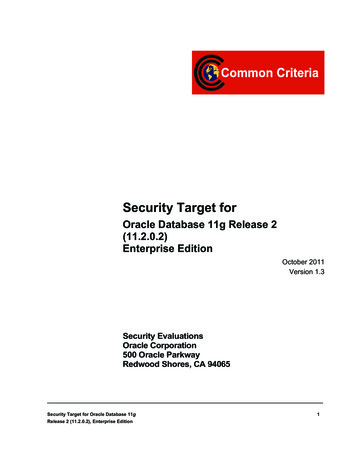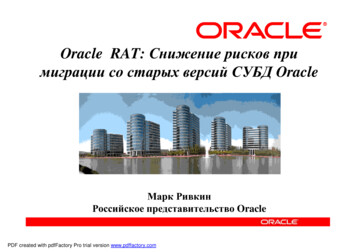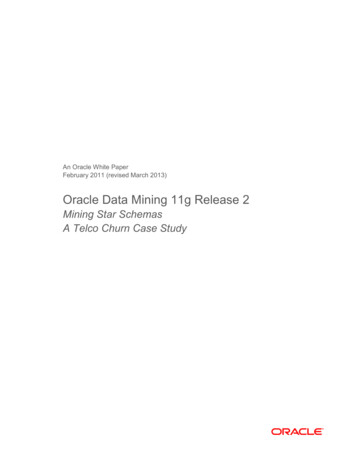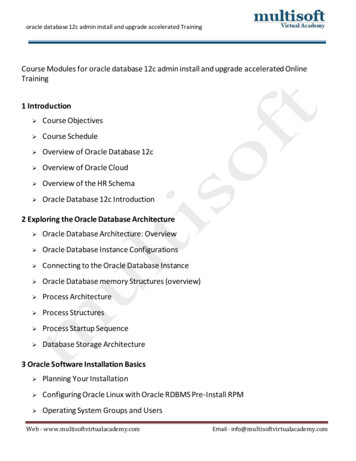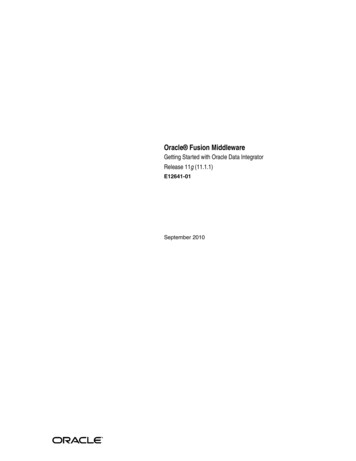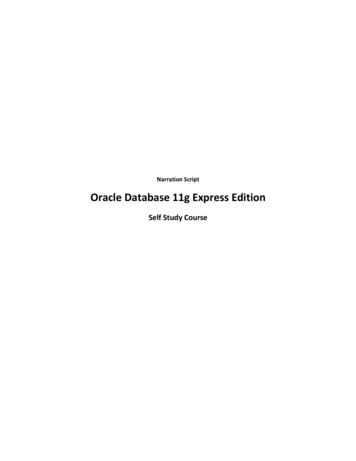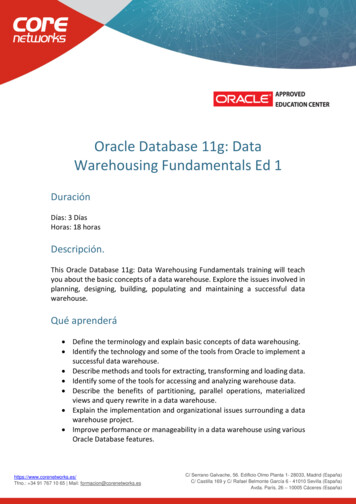
Transcription
Oracle Database 11g: DataWarehousing Fundamentals Ed 1DuraciónDías: 3 DíasHoras: 18 horasDescripción.This Oracle Database 11g: Data Warehousing Fundamentals training will teachyou about the basic concepts of a data warehouse. Explore the issues involved inplanning, designing, building, populating and maintaining a successful datawarehouse.Qué aprenderá Define the terminology and explain basic concepts of data warehousing. Identify the technology and some of the tools from Oracle to implement asuccessful data warehouse. Describe methods and tools for extracting, transforming and loading data. Identify some of the tools for accessing and analyzing warehouse data. Describe the benefits of partitioning, parallel operations, materializedviews and query rewrite in a data warehouse. Explain the implementation and organizational issues surrounding a datawarehouse project. Improve performance or manageability in a data warehouse using variousOracle Database features.https://www.corenetworks.es/Tfno.: 34 91 767 10 65 Mail: formacion@corenetworks.esC/ Serrano Galvache, 56. Edificio Olmo Planta 1- 28033, Madrid (España)C/ Castilla 169 y C/ Rafael Belmonte García 6 - 41010 Sevilla (España)Avda. París, 26 – 10005 Cáceres (España)
A quién se dirige Application DevelopersData Warehouse AdministratorData Warehouse AnalystData Warehouse DeveloperDeveloperFunctional ImplementerProject ManagerSupport EngineerRequisitos Knowledge of client-server technology (Suggested Prerequisite) Knowledge of general data warehousing concepts (SuggestedPrerequisite) Knowledge of relational server technology (Suggested Prerequisite)Objetivos1. Describe methods and tools for extracting, transforming, and loading data2. Identify some of the tools for accessing and analyzing warehouse data3. Identify the technology and some of the tools from Oracle to implement asuccessful data warehouse4. Define the decision support purpose and end goal of a data warehouse5. Describe the benefits of partitioning, parallel operations, materializedviews, and query rewrite in a data warehouse6. Explain the implementation and organizational issues surrounding a datawarehouse project7. Use materialized views and query rewrite to improve the data warehouseperformance8. Define the terminology and explain the basic concepts of datawarehousing9. Develop familiarity with some of the technologies required to implementa data warehousehttps://www.corenetworks.es/Tfno.: 34 91 767 10 65 Mail: formacion@corenetworks.esC/ Serrano Galvache, 56. Edificio Olmo Planta 1- 28033, Madrid (España)C/ Castilla 169 y C/ Rafael Belmonte García 6 - 41010 Sevilla (España)Avda. París, 26 – 10005 Cáceres (España)
Beneficios para ustedOracle’s Database Partitioning ArchitectureYou'll also explore the basics of Oracle’s Database partitioning architecture,identifying the benefits of partitioning.Review the benefits of parallel operations to reduce response time for dataintensive operations. Learn how to extract, transform and load data (ETL) into anOracle database warehouse.Improve Data Warehouse PerformanceLearn the benefits of using Oracle’s materialized views to improve the datawarehouse performance. Instructors will give a high-level overview of how queryrewrites can improve a query’s performance. Explore OLAP and Data Mining andidentify some data warehouse implementations considerations.Use Data Warehousing ToolsDuring this training, you'll briefly use some of the available data warehousingtools. These tools include Oracle Warehouse Builder, Analytic WorkspaceManager and Oracle Application Express.Contenido1. Introduction Course Objectives Course Schedule Course Pre-requisites and Suggested Pre-requisites The sh and dm Sample Schemas and Appendices Used in theCourse Class Account Information SQL Environments and Data Warehousing Tools Used in thisCoursehttps://www.corenetworks.es/Tfno.: 34 91 767 10 65 Mail: formacion@corenetworks.esC/ Serrano Galvache, 56. Edificio Olmo Planta 1- 28033, Madrid (España)C/ Castilla 169 y C/ Rafael Belmonte García 6 - 41010 Sevilla (España)Avda. París, 26 – 10005 Cáceres (España)
Oracle 11g Data Warehousing and SQL Documentation and OracleBy Examples Continuing Your Education: Recommended Follow-Up Classes2. Data Warehousing, Business Intelligence, OLAP, and Data Mining Data Warehouse Definition and Properties Data Warehouses, Business Intelligence, Data Marts, and OLTP Typical Data Warehouse Components Warehouse Development Approaches Extraction, Transformation, and Loading (ETL) The Dimensional Model and Oracle OLAP Oracle Data Mining3. Defining Data Warehouse Concepts and Terminology Data Warehouse Definition and Properties Data Warehouse Versus OLTP Data Warehouses Versus Data Marts Typical Data Warehouse Components Warehouse Development Approaches Data Warehousing Process Components Strategy Phase Deliverables Introducing Case Study: Roy Independent School District (RISD)4. Business, Logical, Dimensional, and Physical Modeling Data Warehouse Modeling Issues Defining the Business Model Defining the Logical Model Defining the Dimensional Model Defining the Physical Model: Star, Snowflake, and Third NormalForm Fact and Dimension Tables Characteristics Translating Business Dimensions into Dimension Tables Translating Dimensional Model to Physical Modelhttps://www.corenetworks.es/Tfno.: 34 91 767 10 65 Mail: formacion@corenetworks.esC/ Serrano Galvache, 56. Edificio Olmo Planta 1- 28033, Madrid (España)C/ Castilla 169 y C/ Rafael Belmonte García 6 - 41010 Sevilla (España)Avda. París, 26 – 10005 Cáceres (España)
5. Database Sizing, Storage, Performance, and Security Considerations Database Sizing and Estimating and Validating the Database Size Oracle Database Architectural Advantages Data Partitioning Indexing Optimizing Star Queries: Tuning Star Queries Parallelism Security in Data Warehouses Oracle’s Strategy for Data Warehouse Security6. The ETL Process: Extracting Data Extraction, Transformation, and Loading (ETL) Process ETL: Tasks, Importance, and Cost Extracting Data and Examining Data Sources Mapping Data Logical and Physical Extraction Methods Extraction Techniques and Maintaining Extraction Metadata Possible ETL Failures and Maintaining ETL Quality Oracle’s ETL Tools: Oracle Warehouse Builder, SQL*Loader, andData Pump7. The ETL Process: Transforming Data Transformation Remote and Onsite Staging Models Data Anomalies Transformation Routines Transforming Data: Problems and Solutions Quality Data: Importance and Benefits Transformation Techniques and Tools Maintaining Transformation Metadata8. The ETL Process: Loading Data Loading Data into the Warehouse Transportation Using Flat Files, Distributed Systems, andTransportable Tablespaces Data Refresh Models: Extract Processing Environment Building the Loading Processhttps://www.corenetworks.es/Tfno.: 34 91 767 10 65 Mail: formacion@corenetworks.esC/ Serrano Galvache, 56. Edificio Olmo Planta 1- 28033, Madrid (España)C/ Castilla 169 y C/ Rafael Belmonte García 6 - 41010 Sevilla (España)Avda. París, 26 – 10005 Cáceres (España)
Data GranularityLoading Techniques Provided by OraclePostprocessing of Loaded DataIndexing and Sorting Data and Verifying Data Integrity9. Refreshing the Warehouse Data Developing a Refresh Strategy for Capturing Changed Data User Requirements and Assistance Load Window Requirements Planning and Scheduling the Load Window Capturing Changed Data for Refresh Time- and Date-Stamping, Database triggers, and Database Logs Applying the Changes to Data Final Tasks10. Materialized Views Using Summaries to Improve Performance Using Materialized Views for Summary Management Types of Materialized Views Build Modes and Refresh Modes Query Rewrite: Overview Cost-Based Query Rewrite Process Working With Dimensions and Hierarchies11. Leaving a Metadata Trail Defining Warehouse Metadata Metadata Users and Types Examining Metadata: ETL Metadata Extraction, Transformation, and Loading Metadata Defining Metadata Goals and Intended Usage Identifying Target Metadata Users and Choosing Metadata Toolsand Techniques Integrating Multiple Sets of Metadata Managing Changes to Metadatahttps://www.corenetworks.es/Tfno.: 34 91 767 10 65 Mail: formacion@corenetworks.esC/ Serrano Galvache, 56. Edificio Olmo Planta 1- 28033, Madrid (España)C/ Castilla 169 y C/ Rafael Belmonte García 6 - 41010 Sevilla (España)Avda. París, 26 – 10005 Cáceres (España)
12. Data Warehouse Implementation Considerations Project Management Requirements Specification or Definition Logical, Dimensional, and Physical Data Models Data Warehouse Architecture ETL, Reporting, and Security Considerations Metadata Management Testing the Implementation and Post Implementation ChangeManagement Some Useful Resources and White Papershttps://www.corenetworks.es/Tfno.: 34 91 767 10 65 Mail: formacion@corenetworks.esC/ Serrano Galvache, 56. Edificio Olmo Planta 1- 28033, Madrid (España)C/ Castilla 169 y C/ Rafael Belmonte García 6 - 41010 Sevilla (España)Avda. París, 26 – 10005 Cáceres (España)
This Oracle Database 11g: Data Warehousing Fundamentals training will teach you about the basic concepts of a data warehouse. Explore the issues involved in planning, designing, building, populating and maintaining a successful data warehouse. Qué aprenderá Define the terminology and explain basic concepts of data warehousing.
